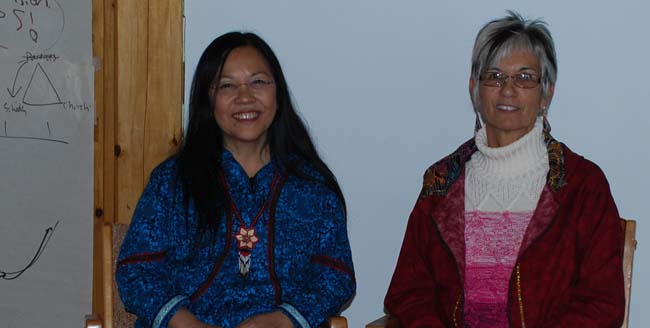Beauty for Ashes program a first for North Shore

By Laura E Young
“To appoint unto them that mourn in Zion, to give unto them beauty for ashes . . .” – Isaiah 61:3
ESPANOLA, ON. – The Beauty for Ashes conference is as intense as the problems it tackles and it has come to the North Shore as component of First Nations health care.
In the deep winter quiet of Anderson Lake and the Anishinabe Spiritual Centre in Espanola, 25 members of the communities of the North Shore Tribal Council (from Sault Ste Marie to Sudbury) began working through the challenges of the issues surrounding child sexual abuse, domestic violence, and child neglect over the week of January 13-17.
They will then help build the foundation for the same program when it’s launched later this year in North Shore First Nations, and for the urban indigenous population in Sault Ste Marie, says Cheryl Hankard, a traditional health and healing program coordinator at Mamaweswen’s N’Mninoeyaa Aboriginal Health Access Centre based in Serpent River First Nation.
It’s the first time Beauty for Ashes has ever been offered outside Alaska, says Katherine Gottlieb, president and CEO of the Southcentral Foundation, the primary health care provider for the indigenous population in the southern half of Alaska.
Beauty for Ashes is a component of the Family Wellness Warriors Initiative of the Southcentral Foundation.
The roots of the BFA program and process emerged after a survey of the population SCF serves over 15 years ago. The communities indicated that, among other key health issues, they wanted to address the issues of child sexual abuse, domestic violence, and child neglect.
Gottlieb says that, with the endorsement of the community, the SCF called out to “the warriors, the warriors are our men to lead the charge,” which then led to the Family Wellness Warriors Initiative.
Beauty for Ashes seeks “to embrace the entire family no matter what role that person played, whether they were the person harmed, or the person that did the harming,” Gottlieb says.
These are not exclusively problems for the Native population to address: “We have found many non-native people who have issues with child sexual abuse, domestic violence, child neglect. It’s just our target we have decided to end it in our world,” she says.
Several years ago the North Shore Tribal communities were looking at new models of health care that were client-centred and traditionally based. Based on a consultant’s findings of what was currently available, the Southcentral Foundation’s Nuka health model was identified for further exploration, says Cheryl Hankard.
A delegation from the North Shore visited Anchorage and was especially intrigued by the Family Wellness Warriors Initiative, Hankard adds.
Hankard has since participated in Beauty for Ashes as part of her training and role as a facilitator. The program was profound and its results cathartic, she says.
As well, Beauty for Ashes is about building relationships, she adds.
“That’s the thread running throughout the program. You’re learning how to respond in a healthy way to our own things and to other people. It’s an amazing program.”
At Espanola’s Anishinabe Spiritual Centre, participants worked through an extensive curriculum during 12-hour days in January. There was much eating and sharing, and laughter, even.
The transformation occurs when silence is broken and stories are shared, but it’s a process that can be hard to describe, because it’s more than getting together in a talking circle, Gottlieb adds.
“You find out what’s been done and how it’s damaged your life. And how you can turn it around for good. You can live with what has happened and continue (living your) life in a better, stronger way. It’s a transformation and a transformative process that happens in those five days.”
With the community members trained, the North Shore looks to secure funding to launch Beauty for Ashes later this fall. The ultimate goal is to run the program one week per month, rotating those who were trained as part of the Alaska Beauty for Ashes training process, says Hankard.
“That was a commitment from the communities because of the value they see in this project,” Hankard says.
N’Mninoeyaa Aboriginal Health Access Centre, based in Serpent River FN, serves the seven First Nations, and the urban indigenous population in the Soo. This mix of Ojibway, Odawa and Potawatmi runs from Atikameksheng Anishnawbek west to Batchawana.
The Southcentral Foundation, a primary care centre in Anchorage, serves 65,000 Alaskans living in an area of 136,000 square miles, including ocean islands in the southern half of Alaska.
For further information: www.anishinabespiritualcentre.ca
https://www.fwwi.org/ and https://www.southcentralfoundation.com/

